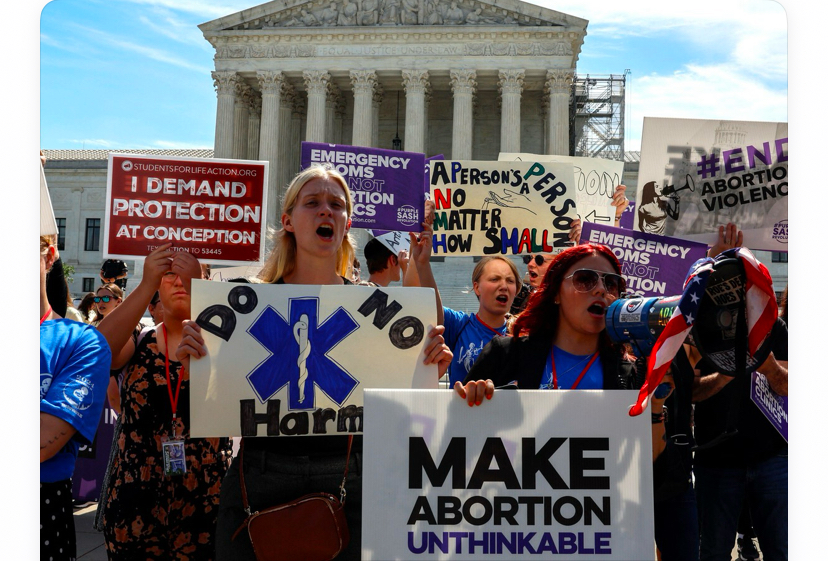NEWS
Supreme Court dropping decisions on guns, abortion, Trump immunity and more in coming days

The Supreme Court in the coming days will issue a flurry of potentially blockbuster decisions on gun rights, abortion access, social media content, homelessness, federal regulatory authority, the opioid crisis and whether former President Donald Trump – and others – can be prosecuted for trying to overturn the 2020 election.

The high court, which tries to dispense of pending cases by the end of June, has an unusually large number of decisions pending, particularly on hot button issues. Given the current pace of opinions, the term could slip into early July, something that has not happened since the height of the pandemic.
And the opinions will be dropping in the lead up to the first presidential debate, on June 27, between Trump and President Joe Biden.
Biden has already tried to make the Supreme Court a major issue in the campaign.
“The Supreme Court has never been as out of kilter as it is today,” Biden said during a recent star-studded Hollywood fundraiser. “I mean never.”
Trump has touted the three appointments he made that gave the court a supermajority of conservatives as one of his top accomplishments as president. But his campaign was cir
o steal the 2020 election can go forward.
Critics charge that the court has taken so long to decide the case that it will likely to be impossible for a trial to conclude before the November election − even if a majority rule Trump is not immune from prosecution.
That’s particularly true if the court finds Trump has some immunity and requires the judge overseeing the trial to conduct additional proceedings to determine how that applies to the specific charges he faces. The high court could also say Trump must be given a chance to appeal that determination, which would further delay a trial.
What charges can be brought against Jan. 6 defendants?
Another case deals with an obstruction charge wielded against one-fourth of the defendants in the Capitol attack on Jan. 6, 2021 – and against Trump.
Joseph Fischer, a former police officer in central Pennsylvania, entered the Capitol and was charged with obstructing Congress, which was counting Electoral College votes that confirmed Biden won the election.
The issue is whether the law making obstruction a crime was meant to apply only to the destruction of documents rather than interrupting a public meeting.
The decision could have broad impact. About 350 out of the first 1,350 defendants from Jan. 6 were charged under the obstruction law.
Two of the four federal charges in Trump’s election interference case fall under the obstruction law. He could potentially benefit if the justices overturn the law or restrict its application for interrupting Congress.
Are emergency abortions allowed in states with strict bans?
The Biden administration challenged Idaho’s strict abortion ban, arguing it conflicts with a federal law that requires hospitals provide stabilizing care.
Idaho allows abortions to save the life – but not the health – of the mother.
Doctors in Idaho say they can’t treat women who might lose organs or their reproductive ability, have uncontrollable bleeding or suffer other serious health consequences without an abortion − unless her life is clearly in danger.
The decision will be the first time the court has weighed in on abortion bans passed since it overturned Roe v. Wade in 2022.
Is a law banning domestic abusers from having guns constitutional?
After a Texas man, Zackey Rahimi, who was involved in five shootings pleaded guilty to the federal crime of possessing guns while subject to a restraining order, an appeals court threw out his conviction.
The New Orleans-based 5th U.S. Circuit Court of Appeals relied on the Supreme Court’s blockbuster 2022 decision that gun regulations must be “consistent with this nation’s historical tradition of firearm regulation” to survive court challenges.
If the Supreme Court rules that a law banning domestic abusers from owning guns is not consistent with past regulations so violates the 2nd Amendment, it would be a continuation of the conservative court’s expansion of gun rights even for potentially dangerous people.
But such a decision could also help the president’s son, Hunter Biden, who was convicted this month of lying about his drug use when buying a revolver in 2018. Like Rahimi, Biden has argued the charge is unconstitutional under the Supreme Court’s 2022 decision.
























